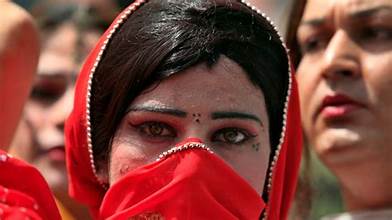Legal and Healthcare Gaps Leave Pakistan’s Intersex Community Vulnerable
In Pakistan, the constitutional guarantee of equality is overshadowed by the harsh reality faced by intersex individuals, who suffer from systemic neglect and discrimination.
Although legal frameworks are designed to protect all citizens, they often fail to account for the specific vulnerabilities of the intersex community, leaving them without adequate protections from societal prejudice and medical exploitation.
Intersex individuals in Pakistan are marginalized by societal norms and expectations of “normalcy.” They are often viewed as disabled, not because of inherent impairments, but due to their differences, which society views as limitations.
Article 25 of the Constitution, which promises equality for all citizens, does not provide true equality for intersex individuals. Unlike women and children, the intersex community remains unprotected, leaving them exposed to discrimination and inequality.
Despite existing laws meant to protect everyone, the specific needs of intersex individuals are frequently overlooked. For instance, the Transgender Persons Act of 2018 includes a broad range of people but does not adequately address the distinct challenges faced by the intersex community.
Intersex individuals in Pakistan also face significant healthcare disparities, exacerbated by social stigma, weak legal protections, and a lack of specialized medical care. Despite the 2018 transgender protection bill, there are no dedicated clinics for gender health, and medical professionals lack the necessary training to handle intersex health issues. This leads to inappropriate treatments, such as non-consensual cosmetic surgeries to align individuals with binary gender norms—an act the United Nations views as a violation of human rights.
To address these challenges, medical education must be reformed to foster empathy and understanding among healthcare providers. Specialized services for intersex health should also be established.
A powerful portrayal of the struggles faced by intersex individuals is seen in the Argentinean film *XXY*, which follows Alex, a 15-year-old intersex teenager. The film highlights the stigmatization and bullying intersex individuals face—issues that are also prevalent in Pakistan. Language plays a significant role in reinforcing societal attitudes, with derogatory terms like “chhakka” and “khusra” perpetuating negative stereotypes. Effective policies must ensure the respectful representation of the intersex community in media.
The Transgender Persons Act of 2018 includes a provision for free education for intersex and transgender children. However, without comprehensive anti-bullying and anti-rape measures, this provision falls short. Intersex children often face violence and sexual abuse, both at home and in schools, leading to high dropout rates and limited access to education.
Understanding the intersection of different forms of discrimination is key to addressing the plight of the intersex community. While transgender individuals identify with a gender different from their assigned sex at birth, intersex people are born with physical traits that do not fit typical male or female classifications. Grouping intersex individuals under the transgender umbrella can obscure their unique experiences and create a hierarchy where transgender issues receive more attention, further marginalizing intersex people.
Activists and academics have developed models that emphasize the societal roots of gender discrimination. The “Social Model of Disability,” for example, argues that external forces like medical, legal, and governmental systems impose gender discrimination. This model distinguishes between impairment, which is a physical limitation, and disability, a socially constructed barrier.
Intersex individuals may not have physical impairments, but society often deems them incapable of performing roles typically assigned to males or females. In the documentary *Pakistani Transgenders: The Open Secret*, Maggie, an educated transgender woman, expresses her desire to become an air hostess but is forced into prostitution due to societal barriers. This illustrates how narrow constructs of “normalcy” restrict career opportunities for intersex and transgender individuals.
In Pakistan, rape cases involving intersex and transgender individuals are rarely reported. Maggie’s experience of gang rape, as depicted in the documentary, is a stark example. When she reported the crime, the police dismissed her, claiming it was “part of her job.” This highlights the urgent need for legal protections tailored to the intersex community.
The character Anjum in Arundhati Roy’s *The Ministry of Utmost Happiness* powerfully illustrates the lack of rights and inclusivity for intersex people in Asian society. Her journey, from being born with both male and female characteristics as Aftab to facing societal rejection, reflects the deep-rooted prejudice and ignorance surrounding intersex identities.
Many intersex individuals struggle to obtain identity documents that reflect their true gender, leading to barriers in accessing basic rights and services. In 2012, Pakistan’s Supreme Court acknowledged the rights of the intersex community, declaring that they should be treated as equal citizens. Yet, this ruling remains only partially implemented, as evidenced in the documentary, where officials at NADRA still refuse to issue ID cards to intersex people.
Gender should be recognized as a cultural identity, shaped by history and shared experiences. It is crucial to include gender minorities as experts in their own lives and histories. In Pakistan, the absence of intersex individuals in legislative processes highlights the need to engage them as active citizens rather than marginalizing them as outsiders.
In conclusion, the intersex community in Pakistan faces significant challenges stemming from societal attitudes and legal shortcomings. Addressing these issues requires a holistic approach that ensures the inclusion of intersex voices and guarantees real equality for all.
Follow us on our social media platforms here: Twitter WHATSAPP CHANNEL FACEBOOK PAGE






Comments are closed, but trackbacks and pingbacks are open.